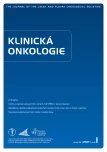Failure of adjuvant treatment for malignant melanoma – what next?
Authors:
MUDr. Žiaran Miroslav 1; MUDr. Dvořák Petr 2; MUDr. Hoffmann Petr 2; MUDr. Kopecký Jindřich 1
Authors‘ workplace:
Klinika onkologie a radioterapie FN Hradec Králové
1; Radiologická klinika FN Hradec Králové
2
Published in:
Klin Onkol 2021; 34(1): 73-77
Category:
Case Report
doi:
https://doi.org/10.48095/ccko202173
Overview
Background: The possibilities of adjuvant therapy of malignant melanoma have significantly expanded in recent years. Based on the results of clinical studies, immunotherapy represented by checkpoint inhibitors (ipilimumab, pembrolizumab, nivolumab) and targeted therapies (dabrafenib plus trametinib) in patients with a proven mutation in the BRAF gene were included in the treatment protocols. In the Czech Republic, nivolumab and combination therapy of dabrafenib with trametinib are currently available for clinical practice. However, the question remains how to proceed if relapse or generalization occurs after the adjuvant treatment. The following case study describes one of possible solutions.
Case report: The article presents the failure of adjuvant nivolumab immunotherapy in a patient with locally advanced stage IIIC malignant melanoma. Ipilimumab has been selected as a treatment choice and demonstrated its efficacy. However, its administration was associated with immune-related side effects. These were diagnosed and successfully treated in the internal department in close cooperation with our department of oncology.
Conclusion: Although adjuvant therapy has significantly reduced a risk of disease relapse, there is a cohort of patients in whom adjuvant therapy fails. Failure may occur after the end of the therapy or, as in our case, during the therapy. Based on currently available data, it is not possible to unambiguously choose the optimal procedure after adjuvant therapy failure. Currently, there is no other way than following clinical experience and reimbursement regulations, or enrolling the patient in a clinical trial. Immune-related adverse effects require particular attention as they are unique due to their mechanism of origin and often require a multidisciplinary approach.
Keywords:
malignant melanoma – adjuvant therapy – nivolumab – ipilimumab
Sources
1. Krejci D, Zapletalova M, Svobodova I et al. Epidemiological trends for childhood and adolescent cancers in the period 1994–2016 in the Czech Republic. Klin Onkol 2019; 32 (6): 426–435. doi: 10.14735/amko2019426.
2. Eggermont AMM, Chiarion-Sileni V, Grob JJ et al. Adjuvant ipilimumab versus placebo after complete resection of stage III melanoma: long-term follow-up results of the European Organisation for Research and Treatment of Cancer 18071 double-blind phase 3 randomised trial. Eur J Cancer 2019; 119 : 1–10. doi: 10.1016/j.ejca.2019.07. 001.
3. Eggermont AM, Blank CU, Mandala M et al. Adjuvant pembrolizumab versus placebo in resected stage III melanoma. N Engl J Med 2018; 378 (19): 1789–1801. doi: 10.1056/NEJMoa1802357.
4. Weber J, Mandala M, Del Vecchio M et al. Adjuvant nivolumab versus ipilimumab in resected stage III or IV melanoma. N Engl J Med 2017; 377 (19): 1824–1835. doi: 10.1056/NEJMoa1709030.
5. Long GV, Hauschild A, Santinami M et al. Adjuvant dabrafenib plus trametinib in stage III BRAF-mutated melanoma. N Engl J Med 2017; 377 (19): 1813–1823. doi: 10.1056/NEJMoa1708539.
6. Balch CM, Gershenwald JE, Soong SJ et al. Final version of 2009 AJCC melanoma staging and classification. J Clin Oncol 2009; 27 (36): 6199–6206. doi: 10.1200/JCO.2009.23.4799.
7. Centanni M, Moes DJAR, Trocóniz IF et al. Clinical pharmacokinetics and pharmacodynamics of immune checkpoint inhibitors. Clin Pharmacokinet 2019; 58 (7): 835–857. doi: 10.1007/s40262-019-00748-2.
8. Larkin J, Chiarion-Sileni V, Gonzalez R et al. Combined nivolumab and ipilimumab or monotherapy in untreated melanoma. N Engl J Med 2015; 373 (1): 23–34. doi: 10.1056/NEJMc1509660.
9. Kopecky J, Kubecek O, Geryk T et al. Nivolumab induced encephalopathy in a man with metastatic renal cell cancer: a case report. J Med Case Rep 2018; 12 (1): 262. doi: 10.1186/s13256-018-1786-9.
10. Kopecky J, Kubecek O, Geryk T et al. Hepatic injury induced by a single dose of nivolumab – a case report and literature review. Klin Onkol 2019; 32 (2): 133–138. doi: 10.14735/amko2019133.
Labels
Paediatric clinical oncology Surgery Clinical oncologyArticle was published in
Clinical Oncology

2021 Issue 1
- Possibilities of Using Metamizole in the Treatment of Acute Primary Headaches
- Metamizole at a Glance and in Practice – Effective Non-Opioid Analgesic for All Ages
- Metamizole vs. Tramadol in Postoperative Analgesia
- Spasmolytic Effect of Metamizole
- Safety and Tolerance of Metamizole in Postoperative Analgesia in Children
-
All articles in this issue
- Patnáct let Národního onkologického programu České republiky a jeho vliv na výsledky u solidních nádorů dospělých v přehledu a číslech
- Breast cancer rehabilitation
- The development and significance of microRNA sequence variants in carcinogenesis
- Germline mutations in RAD51C and RAD51D and hereditary predisposition to ovarian cancer
- Patient delay in presenting symptoms of breast cancer in women in the Czech Republic
- Pembrolizumab as a first-line therapy in spinocellular esophageal cancer
- Squamous cell rectal cancer in a young woman
- Failure of adjuvant treatment for malignant melanoma – what next?
- Aktuality z odborného tisku
- Král Z, Adam Z et al. Histiocytární neoplazie a další vybrané velmi vzácné krevní nemoci.
- Zemřela Mgr. Jana Drexlerová
- Droplet digital PCR as a novel diagnostic tool
- Pathological response and clinical outcomes in operable triple-negative breast cancer with cisplatin added to standard neoadjuvant chemotherapy
- Post-treatment persistent alpha-fetoprotein elevation in a patient with testicular cancer
- Four years of low dose enzalutamide for metastatic castration-resistant prostate cancer
- Clinical Oncology
- Journal archive
- Current issue
- About the journal
Most read in this issue
- Breast cancer rehabilitation
- Germline mutations in RAD51C and RAD51D and hereditary predisposition to ovarian cancer
- Droplet digital PCR as a novel diagnostic tool
- Squamous cell rectal cancer in a young woman
